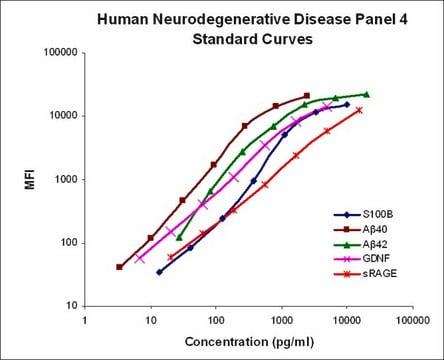HNS2MAG-95K
MILLIPLEX® Human Neuroscience Magnetic Bead Panel 2 - Neuroscience Multiplex Assay
The analytes available for this multiplex kit are: Angiogenin, ApoE4, FABP3, Ferritin, Neurogranin, and TREM2.
About This Item
Recommended Products
species reactivity
human
manufacturer/tradename
Milliplex®
assay range
accuracy: 124%
(Neurogranin)
accuracy: 84%
(FABP3)
accuracy: 85%
(ApoE4)
accuracy: 94%
(TREM2)
accuracy: 97%
(Angiogenin)
sensitivity: 11.0 pg/mL
(MinDC + 2SD; TREM2)
sensitivity: 14.3 pg/mL
(MinDC + 2SD; FABP3)
sensitivity: 162.8 pg/mL
(MinDC + 2SD; ApoE4)
sensitivity: 19.9 pg/mL
(MinDC + 2SD; Neurogranin)
sensitivity: 5.8 pg/mL
(MinDC + 2SD; Angiogenin)
sensitivity: 6.1 pg/mL
(MinDC + 2SD; Ferritin)
standard curve range: 15-50,000 pg/mL
(TREM2)
standard curve range: 2-10,000 pg/mL
(Angiogenin)
standard curve range: 24-100,000 pg/mL
(FABP3)
standard curve range: 244-1,000,000 pg/mL
(ApoE4)
standard curve range: 5-20,000 pg/mL
(Neurogranin)
standard curve range: 6-25,000 pg/mL
(Ferritin)
inter-assay cv: <10%
intra-assay cv: <5%
(Angiogenin)
inter-assay cv: <10%
intra-assay cv: <5%
(FABP3)
inter-assay cv: <10%
intra-assay cv: <5%
(TREM2)
inter-assay cv: <15%
intra-assay cv: <10%
(Ferritin)
inter-assay cv: <15%
intra-assay cv: <10%
(Neurogranin)
inter-assay cv: <15%
intra-assay cv: <5%
(ApoE4)
technique(s)
multiplexing: suitable
detection method
fluorometric (Luminex xMAP)
General description
MILLIPLEX® Human Neuroscience Bead Panel 2 is a 6-plex kit to be used for the simultaneous quantification of any or all of the following analytes in cerebrospinal fluid (CSF), serum/plasma and cell/tissue culture supernatants for homogenates: Angiogenin, ApoE4, FABP3, Ferritin, Neurogranin, TREM2.
Panel Type: Neuroscience
Specificity
Cross-reactivity between the antibodies and any of the other analytes in this panel is non-detectable or negligible. There is <5% cross-reactivity from ApoE2 and ApoE3 recombinant proteins on the ApoE4 beads.
Application
- Analytes: Angiogenin, ApoE4, FABP3, Ferritin, Neurogranin, TREM2
- Recommended Sample type: Plasma, Serum, CSF, Cell/Tissue culture supernatant
- For Plasma/Serum a 1:10 dilution is recommended for the optimal detection of the analytes FABP3, Ferritin, Neurogranin and TREM2.
- For Plasma/Serum a 1:200 dilution for ApoE4 and Angiogenin is recommended.
- Because the sample dilutions differ for Plasma/Serum samples ApoE4 and Angiogenin cannot be plexed in the same assay as FABP3, Ferritin, Neurogranin and TREM2.
- CSF samples require a 1:10 dilution and so may all be plexed together
- Cell/Tissue culture supernatants or homogenates may be used neat or diluted in appropriate control medium.
- Bead diluent must be present in order to detect Angiogenin. (Biotinylated-Angiogenin detection antibody is included in the bead diluent.)
- Research Category: Neuroscience
Features and Benefits
Packaging
Storage and Stability
Legal Information
Disclaimer
Signal Word
Danger
Hazard Statements
Precautionary Statements
Hazard Classifications
Acute Tox. 3 Dermal - Acute Tox. 4 Inhalation - Acute Tox. 4 Oral - Aquatic Chronic 2 - Eye Irrit. 2 - Skin Sens. 1
Storage Class Code
6.1C - Combustible acute toxic Cat.3 / toxic compounds or compounds which causing chronic effects
Certificates of Analysis (COA)
Search for Certificates of Analysis (COA) by entering the products Lot/Batch Number. Lot and Batch Numbers can be found on a product’s label following the words ‘Lot’ or ‘Batch’.
Already Own This Product?
Find documentation for the products that you have recently purchased in the Document Library.
Related Content
MILLIPLEX® multiplex immunoassays detect Alzheimer's biomarkers in neuroscience research using high sensitivity technology.
MILLIPLEX® multiplex immunoassays detect Alzheimer's biomarkers in neuroscience research using high sensitivity technology.
MILLIPLEX® multiplex immunoassays detect Alzheimer's biomarkers in neuroscience research using high sensitivity technology.
MILLIPLEX® multiplex immunoassays detect Alzheimer's biomarkers in neuroscience research using high sensitivity technology.
Our team of scientists has experience in all areas of research including Life Science, Material Science, Chemical Synthesis, Chromatography, Analytical and many others.
Contact Technical Service










